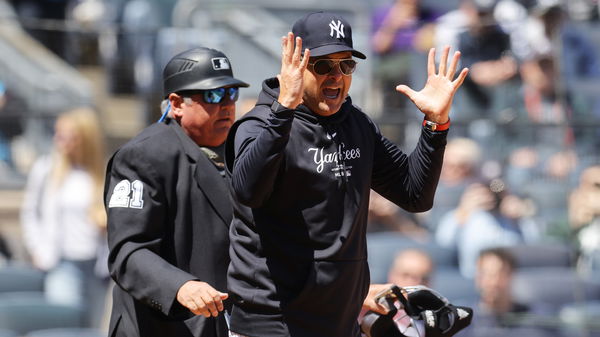

The strange ejection of New York Yankees manager Aaron Boone has left the fans scratching their heads. This ejection came from veteran home plate umpire Hunter Wendelstedt. While the ejection itself is reportedly erroneous, replays further substantiate that it was a fan behind the dugout hurling an insult. Now if Wendelstedt mistook it for coming from Boone, why didn’t the other umpires step up?
Clearly, there seemed to have been an obvious error. However, none of the other umpires on the crew intervened. This begs the question: Why the radio silence from Boone’s fellow umpires? Is Hunter an influential man that no one can stand up against?
ADVERTISEMENT
Article continues below this ad
Why don’t umpires overrule each other despite visible errors?
Well, this brings one’s attention to the hierarchical structure of an umpire crew. Hunter Wendelstedt, as crew chief, holds the ultimate authority on the field. Nevertheless, other umpires can always discuss calls and potentially influence decisions. But in this case, it turns out that the crew chief’s word is ultimately considered final, a stance that led to vivid discussions when Foul Territory addressed it in their podcast.
Another angle of the ejection 👀 pic.twitter.com/eIGP2M0zrf
— YES Network (@YESNetwork) April 22, 2024
ADVERTISEMENT
Article continues below this ad
The Foul Territory podcaster shared his strong opinion, stating, “It’s not him… somebody else has got to step up and say, hey Hunter, sorry it wasn’t him.” This sentiment underscored the potential pressure umpires face in contradicting a veteran umpire, even when presented with clear evidence.
There’s also the issue of precedent. Baseball history offers few examples of umpires publicly reversing a crew chief’s call. A 2018 incident involving bat legality was mentioned, where umpires eventually admitted a mistake, but the ejection stood. This suggests a reluctance to create a situation where umpires are constantly second-guessing each other, potentially leading to confusion and a breakdown in on-field authority.
ADVERTISEMENT
Article continues below this ad
Is there a way to correct the outcome?
There seems to be a believable sense of fraternity that exists within the community of umpires. Additionally, it leads them to protect one another, even in cases of error. The perceived blue wall of silence suggests a reluctance to criticize a colleague, even if at times it is at the expense of a fair outcome.
The Boone ejection has rekindled the debate about the accountability of umpires. Should a system exist where obvious mistakes can be corrected, even if they contradict the senior umpire’s verdict? Is it possible to have a centralized review process, allowing for post-game intervention in tough cases? Well, these are questions that don’t have an answer yet.
ADVERTISEMENT
ADVERTISEMENT
ADVERTISEMENT
ADVERTISEMENT

